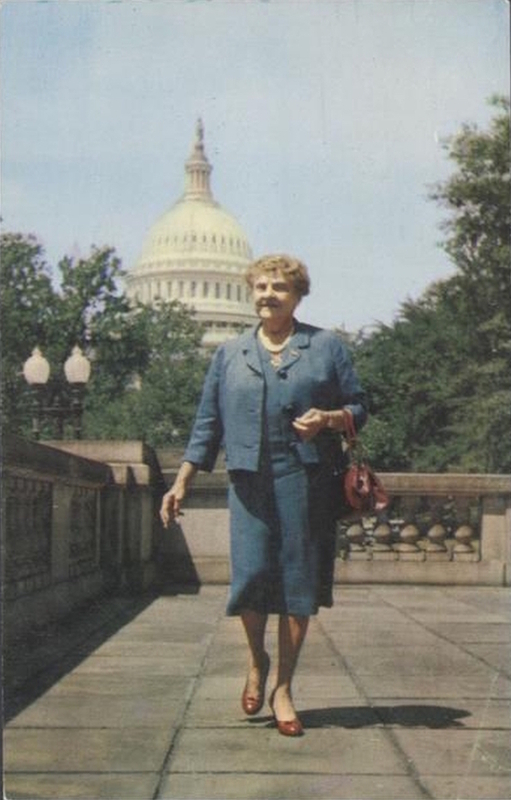Frances Payne Bolton

Congressman Frances Payne Bolton was born Frances Payne Bingham into a wealthy and prominent family of Cleveland in 1885. Two of her grandfathers, William Bingham and Henry B. Payne, introduced her to the world of politics at an early age. William Bingham, well known for his hardware wholesale company Wm. Bingham & Co., served on the Cleveland City Council. Payne became Cleveland's first solicitor under its municipal charter and was later elected to city council before ultimately serving at a national level as a Democratic Senator. Having the familial link to politics may have prepared her for a future political career but her marriage and the death of her husband, Chester C. Bolton, provided her the position for candidacy. She began serving as a Republican House of Representatives member in 1940 to fill her late husband's position and continued serving until her 1968 defeat.
Frances Bolton's family's wealth allowed for the best schooling and many travel opportunities that served her in her future career. Her father was a wealthy banker-industrialist, but it was her uncle Oliver Hazard Payne, who worked alongside John D. Rockefeller in founding the Standard Oil Company, that earned a great deal of economic wealth and established trust funds for each of the Binghams. With this trust, Frances Payne Bolton would be known as one of the wealthiest women in the United States and use her funds to finance various philanthropic measures.
Bolton is most recognized for her involvement with the healthcare field, specifically nursing. Bolton began her involvement by volunteering with the Visiting Nurses Association in 1904 and learned about the healthcare system, nursing profession, and social welfare programs through the experience. Her wealth provided her opportunities to benefit society. She influenced the founding of the Army School of Nursing, which created Army-trained nurses, rather than volunteers, to be used in World War I. She is well remembered throughout Cleveland for providing the financial contributions that enabled Western Reserve University, now Case Western Reserve University, to open one of the first university schools of nursing in the country in 1923. In 1935 the school was renamed the Frances Payne Bolton School of Nursing. As Bolton became a congressman she authored the Bolton Act, which created the Cadet Nurse Corps in 1943. This program expanded the number of trained nurses for the war effort.
Bolton's political actions beyond healthcare have been influential but often overlooked. As she was elected into the House of Representatives, she joined only five other women in that legislative body. Bolton was a "distinctly conservative" member of Congress but often progressive in her support for measures of equality, including supporting a bill to support equal pay for men and women in the workplace in 1954. Bolton's career helped set an example for future women of the possibility to embark on political careers and the success that can be achieved in those careers.
Bolton became involved with foreign affairs in Congress and achieved great success in her career. She reorganized the Foreign Affairs committees and created five permanent sub-committees for better functioning. She paid her own way on several travel missions and became an expert on Communism (writing Strategy and Tactics of World Communism) and the first woman to head an official mission abroad. In 1953 she was promoted to a delegate to the United Nations; she was the first woman to achieve this position. Bolton's work on her mission to Africa remains one of her most overlooked contributions. This trip allowed for a better U.S. connection with the continent and its people, understanding their way of life, building better relationships and promoting the developing of democratic governments in the countries visited. Bolton continued her position in Foreign Affairs until she was defeated in the election of 1968.
After her defeat, Bolton retired from politics but her civic work and philanthropies continued. Historic preservation was another of the causes Bolton supported with her time and finances throughout her life; Mount Vernon was of particular interest to Bolton and lay behind her creation of the Accokeek Foundation to preserve the shores across the Potomac River. Because of her age, she only continued her support for a few more years until passing away in 1977. The immense show of support through local newspapers and at her funeral was indicative of the influence Bolton had on the public. She was praised and remembered as a humanitarian, philanthropist, politician, and patriot.
Images








